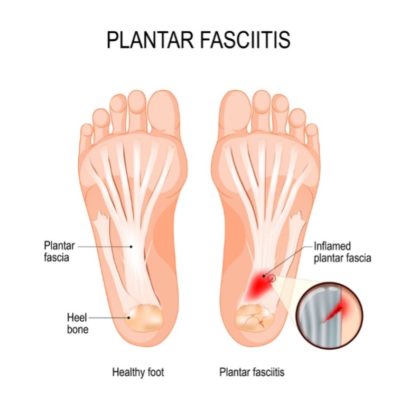Your feet are a complex part of your body because they contain many components. Did you know that you have 26 different bones in each foot? In addition to the complex system of bones, the foot has many joints and tendons. The bones, joints, and tendons must work together in harmony. When they cannot work together in harmony, foot pain can become quite severe and make it difficult for you to walk and carry out your day-to-day activities.
Types of Foot Pain
Just as complex as feet are, there are many types and causes of foot pain. Here we name a few:
Plantar Fasciitis
Achilles Tendonitis
Bone Spurs
Bursitis (Joint Inflammation)
Sciatica Nerve Pain
Broken Foot
It is essential to get a correct diagnosis for foot pain and not self-diagnose. Trying to remedy foot pain without a proper diagnosis could prolong your pain and make it worse. At Carolina Rehab, we focus on discovering the root causes of your problem. In other words, we focus on locating what triggers your symptoms instead of your symptoms themselves.
Foot Pain Relief at Carolina Rehab
We offer effective, drug-free pain relief for foot conditions. Our multi-disciplinary approach combines Chiropractic Adjustments and Manual Therapy with hands-on treatments to support optimal recovery. For example, we use these techniques to address conditions like Plantar Fasciitis.
Foot Pain from Plantar Fasciitis

The plantar fascia is a long, thin ligament that extends from the heel bone and splits and fans out to attach itself to the toes. When the plantar fascia becomes inflamed from overstretching or overuse, a person can experience pain in the heel and bottom of the foot. We call this condition plantar fasciitis.
It is caused by excessive strain on the plantar fascia, which results in potentially painful microtears and inflammation in the surrounding areas of the foot. Weight-bearing stress over prolonged periods and on a repeated basis is a big risk factor for plantar fasciitis.
Plantar fasciitis commonly causes a stabbing pain that usually occurs with your first steps in the morning. As you get up and move, the pain usually decreases, but it might return after long periods of standing or when you stand up after sitting.
This condition causes pain in your heel and sometimes in your arch, making it difficult to be mobile.
Treatment for Plantar Fasciitis at Carolina Rehab
The first thing that will happen is a thorough physical examination and a consultation to describe what you are experiencing. Once we pinpoint what is wrong, we have several treatments available to treat the problem and relieve your pain. Treatment for plantar fasciitis includes:
- Chiropractic Care: Our chiropractors use gentle manipulation to reduce restrictions and misalignments that cause pain. Chiropractic treatment improves nervous system function, allowing your body to manage your pain naturally, reducing inflammation, and improving function.
- Trigger Point Therapy: Trigger point injections use an all-natural sarapin extract. We get this potent anti-inflammatory from the pitcher plant. The injections relax target areas to help restore blood flow and other fluids to relieve pain and regain proper function.
- FX 405 Laser Treatment: We are excited to announce an innovative low-level laser treatment that offers relief of pain and inflammation in patients with chronic plantar fasciitis! It is called the FX 405 Laser Treatment!
Exciting New Laser Treatment for Plantar Fasciitis
The FDA has recently approved the FX 405 for treating plantar fasciitis. The FX 405 is a low-level laser treatment that offers relief of pain and inflammation in patients with chronic plantar fasciitis.
The laser allows treatment without anesthesia, and pain medicine is not necessary. Patients can continue their activities while undergoing treatment. It is a positive and promising option to treat chronic pain in patients with plantar fasciitis instead of potentially damaging treatments commonly suggested, such as surgery or steroid treatments of the foot.
Why Seek Non-Surgical, Non-Steroidal Treatments for Plantar Fasciitis?
There are high risks to surgery and steroid treatments for plantar fasciitis. Risks for surgery of the plantar fascia include:
- Nerve damage.
- Permanent changes in foot shape.
- Flat feet. (You may need to wear arch supports for the rest of your life.)
- More pain than before the surgery. (You may need more surgery to relieve the pain, and you may have permanent numbness in the heel.)
Risks of steroid treatments include:
- Infection
- Vein puncture
- Weakened tendon
- Cartilage deterioration
- Thinning of bones (osteoporosis)
- Bone deterioration (osteonecrosis)
Final Words
Your feet are the foundation for your entire body. When they suffer from pain, misalignments, malformations, and malfunctions, it jeopardizes your whole body. Even without pain, foot dysfunction can cause your whole body to overcompensate, leading to back pain and even headaches, not to mention the emotional stress of discomfort and limitations on movement that can spread from your feet upward.
If you are suffering from pain or dysfunction from a foot problem, we must find your root cause. Masking pain with painkillers only prolongs the problem and can worsen it.
Carolina Rehabilitation Center has many options to treat the problem and relieve your pain without drugs or surgery. Please call us for a complimentary consultation.
Sincerely,
Dr. Craig Strickland

